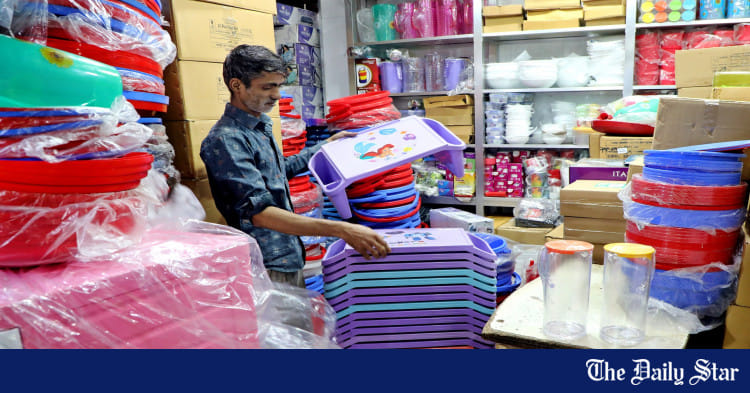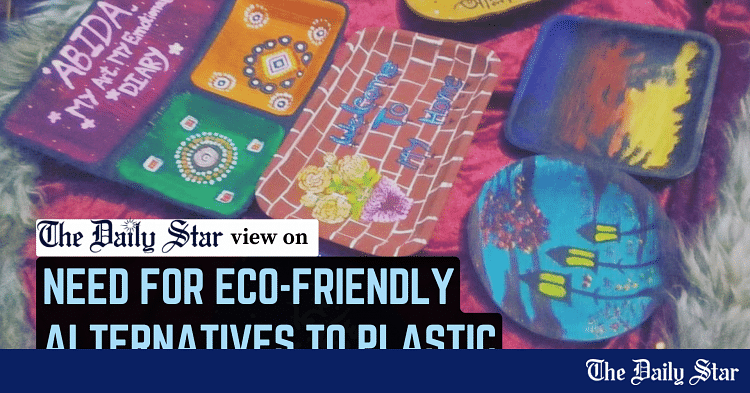- Joined
- Jan 24, 2024
- Messages
- 3,551
- Solutions
- 1
- Reaction score
- 1,842
Source
:
https://www.tbsnews.net/economy/industry/plastic-cos-shifting-focus-exports-more-investments-782270
Plastic cos shifting focus on exports with more investments
Entrepreneurs explore cutting-edge packaging machines at a stall during the 16th Bangladesh International Plastics, Printing, and Packaging Industry Fair held at the International Convention City B

Entrepreneurs explore cutting-edge packaging machines at a stall during the 16th Bangladesh International Plastics, Printing, and Packaging Industry Fair held at the International Convention City Bashundhara in the capital yesterday. The four-day fair concludes today. Photo: Rajib Dhar
Local plastic goods makers are pouring large investments into expansion and upgrading factories as part of a shift in focus from the domestic market to the global.
Currently, the local market size for plastic products is Tk28,000 crore. After meeting local demands, Bangladeshi plastic companies now eye to grab a sizeable share of the $560 billion global market, according to the Bangladesh Plastic Goods Manufacturers and Exporters Association (BPGMEA).
For boosting plastic goods exports, the entrepreneurs seek policy support from the government.
"Masterbatch, a vital ingredient for plastic making goods, had to be imported in 2014. We started producing it in 2015. All types of Masterbatch are now being produced in our company in Bangladesh," Md Rezaul Hakim, chairman and managing director of Colorplus Masterbatch Manufacturing Co, a subsidiary of Plus Group, told The Business Standard on Friday.
Plastic products of different colors are being produced in Bangladesh by using this Masterbatch.

Photo: Rajib Dhar
Razaul said their masterbatch uses pigments, virgin resins and other raw materials from world famous chemical companies. "We are the first in Bangladesh to produce all types of Masterbatch commercially," he stated.
Currently, there are some 6,000 plastic industries in the country, 80% of which are small and medium-sized factories. About 12 lakh people are employed in the sector, according to the BPGMEA.
The Colorplus Masterbatch MD said they have invested Tk100 crore in their industry in a joint financial collaboration with China.
The locally produced masterbatch is used in the plastic parts of locally manufactured TV, fridge, AC and electrical products which is known as engineering plastic.
Rezaul said the local market for masterbatch is about Tk1,000 crore. Now, five to seven more companies are manufacturing this product.
"If there were 200 more companies like this in the country, we would have exported the product like garments in the world market," he said.
Xclusive Can Limited manufactures various containers including plastic drum, lubricant containers, ice-cream containers and paint containers.
The company's founder Syed Nasir told TBS, "We are making quality products by focusing on the country's market. But now we are also looking at exporting products. At present, no packaging item needs to be imported."
He said if the government wants to advance this sector, it has to improve the business environment.

Photo: Rajib Dhar
"Still, we are below competitor countries in terms of business environment. We've no orientation with the bureaucrats. This is one of the problems. Tax policy, VAT policy should be business friendly," he pointed out.
He sought uninterrupted gas and electricity supply alongside their regular price adjustment in line with the international market.
The industrialist informed that they have a plan to expand their business beyond the current level of Tk250 crore per year.
The BPGMEA President Samim Ahmed said, "We're now focusing on the international market. The global market for plastic products is $560 billion. We export $220 million worth of plastic products directly, and $900 million worth of plastic products indirectly through garment products."
BPGMEA has set a $5 billion target for the plastic goods export by the next five years.
He said, plastic products of Bangladesh are being exported to more than 22 countries of the world, including the UK, the USA, Germany, France, Poland, Spain and Canada.
It exported goods ranging from home furnishings, automobiles to medical equipment.
Deluxe Toy Industries owner KM Nahian Hossain told TBS that they are now making exportable toys.
Another entrepreneur Md Alamgir Hossain cited some tax anomalies that are hindering the export of plastic goods from Bangladesh.
The 16th International Plastics, Packaging and Printing Industrial Fair (IPF-2024) of BPGMEA to showcase the latest plastics, digital printing and packaging machinery is ending at the International Convention City Bashundhara in Dhaka today.







